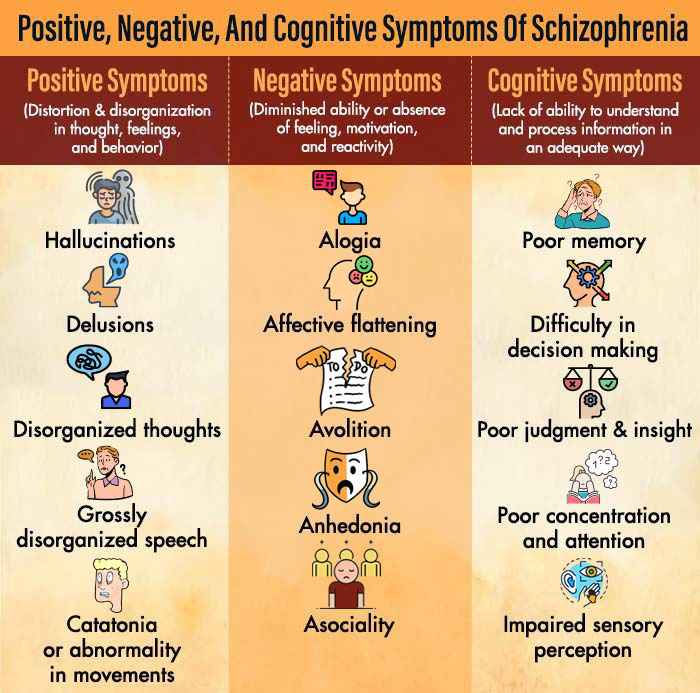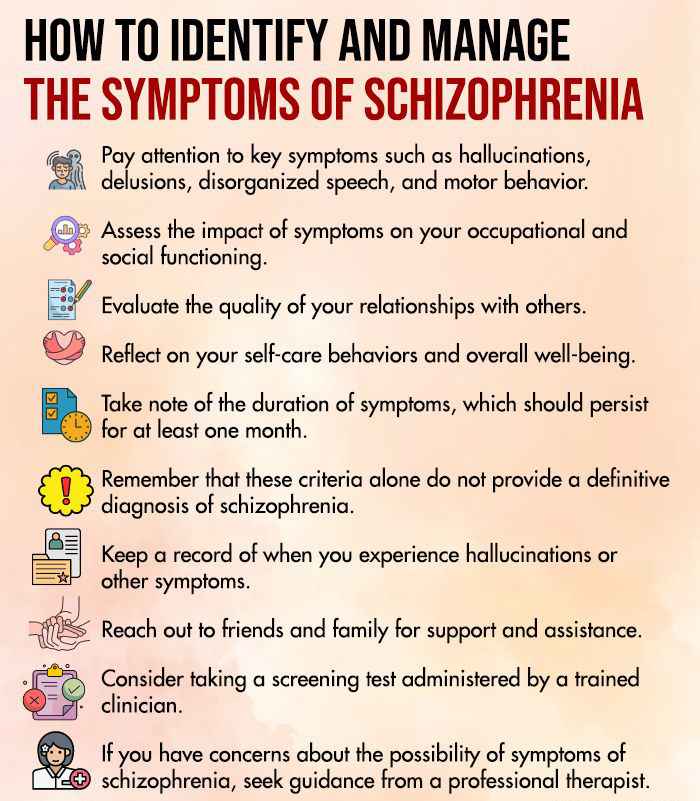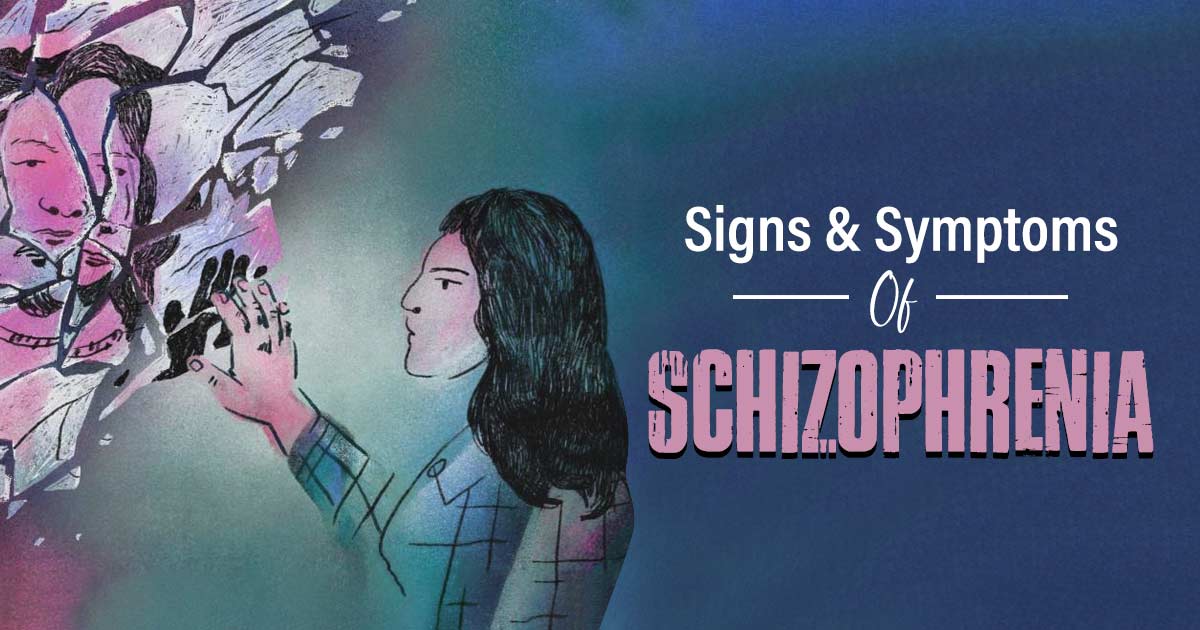Signs and symptoms of schizophrenia are vital for early detection and effective management of this condition. From hallucinations and disorganized speech to social withdrawal and cognitive impairments, delving into the diverse array of early signs and symptoms of schizophrenia shed light on the challenges faced by individuals and underscores the significance of timely intervention.
Schizophrenia Symptoms
Schizophrenia is a multifaceted mental health condition 1 Hany, M., Rehman, B., & Chapman, J. (2023, January 30). Schizophrenia. Nih.gov; StatPearls Publishing. Available from: https://www.ncbi.nlm.nih.gov/books/NBK539864/ encompassing a wide range of interconnected signs and symptoms that intricately affect cognitive, social, emotional, and behavioral aspects of an individual’s life. Early indicators of schizophrenia encompass hallucinations, delusions, disorganized thinking and speech, reduced emotional expression, and declining functionality and social interaction.
Additionally, individuals with schizophrenia may experience symptoms 2 Mitra, S., Mahintamani, T., Kavoor, A. R., & Nizamie, S. H. (2016). Negative symptoms in schizophrenia. Industrial psychiatry journal, 25(2), 135–144. https://doi.org/10.4103/ipj.ipj_30_15 , such as diminished motivation, anhedonia, and difficulties in maintaining relationships and engaging in daily activities.
During the early signs and symptoms of schizophrenia, individuals often exhibit a sense of denial regarding their illness, remaining unaware that their behaviors align with the characteristics of schizophrenia. It is important to understand that the terms “positive” and “negative” 3 Bassett, A. S., Collins, E. J., Nuttall, S. E., & Honer, W. G. (1993). Positive and negative symptoms in families with schizophrenia. Schizophrenia research, 11(1), 9–19. https://doi.org/10.1016/0920-9964(93)90033-f symptoms in schizophrenia do not indicate the presence or absence of benefits, but rather describe the nature of their impact on individuals affected by the disorder.
Read More About Schizophrenia Here

What are Signs and Symptoms of Schizophrenia
Schizophrenia is characterized by a range of 4 George, M., Maheshwari, S., Chandran, S., Manohar, J. S., & Sathyanarayana Rao, T. S. (2017). Understanding the schizophrenia prodrome. Indian journal of psychiatry, 59(4), 505–509. https://doi.org/10.4103/psychiatry.IndianJPsychiatry_464_17 signs and symptoms, such as:
Positive Signs and Symptoms of Schizophrenia
Positive signs and symptoms of schizophrenia in the elderly can also be present similarly in younger adults which include exaggerated ideas 5 Ruiz-Castañeda, P., Santiago Molina, E., Aguirre Loaiza, H., & Daza González, M. T. (2022). Positive symptoms of schizophrenia and their relationship with cognitive and emotional executive functions. Cognitive research: principles and implications, 7(1), 78. https://doi.org/10.1186/s41235-022-00428-z , perceptions, or actions that indicate a person’s difficulty distinguishing reality from illusion. In this context, “positive” refers to the presence of symptoms rather than their absence. These symptoms can include:
1. Hallucinations
Individuals with schizophrenia may perceive 6 Chaudhury S. (2010). Hallucinations: Clinical aspects and management. Industrial psychiatry journal, 19(1), 5–12. https://doi.org/10.4103/0972-6748.77625 sensory stimuli that others do not. Different types of hallucinations include:
- Auditory by hearing voices inside their head that can be angry, urgent, or commanding.
- Visual by seeing lights, objects, people, or patterns, often including deceased loved ones or friends.
- Olfactory and Gustatory by sensing both pleasant and unpleasant smells and tastes. They may believe they are being poisoned and refuse to eat.
- Tactile with feeling sensations of movement on the body, such as hands or insects.
2. Delusions
These are strongly held beliefs 7 Kiran, C., & Chaudhury, S. (2009). Understanding delusions. Industrial psychiatry journal, 18(1), 3–18. https://doi.org/10.4103/0972-6748.57851 that seem unusual to most people and can be easily disproven. Examples of delusions include:
- Persecutory which is the feeling that someone is pursuing, stalking, framing, or deceiving them.
- Referential if believing that public forms of communication, like song lyrics or gestures from a TV host, hold special messages intended only for them.
- Somatic is focusing on bodily concerns and believing in severe illnesses or bizarre health issues, such as having worms under the skin.
- Erotomanic is convinced that a celebrity is in love with them or that their partner is unfaithful.
- Religious is thinking that they have a unique relationship with a deity or feeling possessed by a demon.
- Grandiose is holding a belief of being a significant figure on the global stage, like a prominent entertainer or politician.
3. Confused Thoughts and Disorganized Speech
Individuals with schizophrenia may struggle 8 Mota, N. B., Copelli, M., & Ribeiro, S. (2017). Thought disorder measured as random speech structure classifies negative symptoms and schizophrenia diagnosis 6 months in advance. NPJ schizophrenia, 3, 18. https://doi.org/10.1038/s41537-017-0019-3 to organize and process their thoughts, leading to difficulties in many ways. During a conversation, such individuals experience:
- Tangentiality- Diverging from the main topic of discussion without returning to it.
- Neologisms- Creating new words or using words in unconventional ways that are not comprehensible to others.
- Circumstantiality- Including unnecessary and irrelevant details when communicating, leading to difficulty in reaching the exact point.
- Perseveration- Repeating words, phrases, or ideas excessively, often unrelated to the current conversation.
- Flight of ideas- Rapid and continuous flow of thoughts that are loosely connected or unrelated to one another.
4. Movement Disorders
Certain individuals with schizophrenia may display restlessness or repetitive movements. Alternatively, they may remain motionless for extended periods, a state referred to as catatonia. 9 Burrow, J. P., Spurling, B. C., & Marwaha, R. (2021). Catatonia. PubMed; StatPearls Publishing. Available from: https://www.ncbi.nlm.nih.gov/books/NBK430842/ It is important to note that individuals with schizophrenia are typically not prone 10 Cho, W., Shin, W. S., An, I., Bang, M., Cho, D. Y., & Lee, S. H. (2019). Biological Aspects of Aggression and Violence in Schizophrenia. Clinical psychopharmacology and neuroscience : the official scientific journal of the Korean College of Neuropsychopharmacology, 17(4), 475–486. https://doi.org/10.9758/cpn.2019.17.4.475 to violence, contrary to popular misconceptions.
Negative Signs and Symptoms of Schizophrenia
Negative signs and symptoms of schizophrenia in elderly and younger people manifest the absence 11 Sarkar, S., Hillner, K., & Velligan, D. I. (2015). Conceptualization and treatment of negative symptoms in schizophrenia. World journal of psychiatry, 5(4), 352–361. https://doi.org/10.5498/wjp.v5.i4.352 or reduction of regular psychological functioning related to thinking, perception, and behavior. Some noticeable manifestations include:
1. Lack of Pleasure
Individuals may no longer derive enjoyment from activities they once found pleasurable, a condition known 12 Liang, S., Wu, Y., Hanxiaoran, L., Greenshaw, A. J., & Li, T. (2022). Anhedonia in Depression and Schizophrenia: Brain Reward and Aversion Circuits. Neuropsychiatric disease and treatment, 18, 1385–1396. https://doi.org/10.2147/NDT.S367839 as anhedonia.
2. Speech Difficulties
They may exhibit limited speech or display an absence of emotional expression, a condition referred to 13 Marder, S. R., & Galderisi, S. (2017). The current conceptualization of negative symptoms in schizophrenia. World psychiatry : official journal of the World Psychiatric Association (WPA), 16(1), 14–24. https://doi.org/10.1002/wps.20385 as alogia.
3. Flattening
People with schizophrenia might appear emotionally dull or lacking 14 Lindner, C., Dannlowski, U., Bauer, J., Ohrmann, P., Lencer, R., Zwitserlood, P., Kugel, H., & Suslow, T. (2016). Affective Flattening in Patients with Schizophrenia: Differential Association with Amygdala Response to Threat-Related Facial Expression under Automatic and Controlled Processing Conditions. Psychiatry investigation, 13(1), 102–111. https://doi.org/10.4306/pi.2016.13.1.102 in facial expressions and vocal intonation, which is known as flat affect or blunt affect. They may not exhibit typical signs of emotions or smile appropriately in response to conversations or events around them.
4. Withdrawal
They may gradually withdraw from social interactions and isolate themselves. Engaging in conversations with them may require significant effort to elicit responses.
5. Avolition
Avolition is a symptom commonly observed 15 DeRosse, P., Barber, A. D., Fales, C. L., & Malhotra, A. K. (2019). Deconstructing Avolition: Initiation vs persistence of reward-directed effort. Psychiatry research, 273, 647–652. https://doi.org/10.1016/j.psychres.2019.01.073 in schizophrenia, characterized by a reduction in motivation, goal-directed behavior, and the ability to initiate and sustain purposeful activities. Individuals experiencing avolition may struggle with everyday tasks, pursuing personal interests or goals, and basic self-care activities.
Cognitive Symptoms
Cognitive symptoms of 16 Tripathi, A., Kar, S. K., & Shukla, R. (2018). Cognitive Deficits in Schizophrenia: Understanding the Biological Correlates and Remediation Strategies. Clinical psychopharmacology and neuroscience : the official scientific journal of the Korean College of Neuropsychopharmacology, 16(1), 7–17. https://doi.org/10.9758/cpn.2018.16.1.7 schizophrenia encompass:
- Impaired attention and difficulty in concentration.
- Lack of insight with limited awareness or understanding of one’s own illness.
- Problems with memory and recall.
- Ambivalent behavior with mixed or conflicting feelings, attitudes, or motivations towards specific thoughts, beliefs, or decisions.
- Struggling to accurately gauge potential risks and benefits, leads to poor judgment.
- Poor ability in executive functioning, such as planning, organizing, and problem-solving.

Takeaway
Schizophrenia symptoms include positive symptoms like hallucinations and delusions, negative symptoms such as social withdrawal and reduced emotional expression, cognitive impairments, and affective symptoms like depression and anxiety. Early detection, proper diagnosis, and comprehensive treatment are crucial for managing symptoms and improving the overall well-being of individuals with schizophrenia.
Read More About Anxiety Here
At A Glance
- Schizophrenia is a complex mental health condition characterized by a range of signs and symptoms that affect various domains of functioning.
- Signs and symptoms of schizophrenia are crucial for early detection and effective management of the condition.
- It is important to note that “positive” and “negative” in this context do not imply the presence or absence of benefit.
- Positive symptoms are exaggerated ideas, perceptions, or actions that indicate a person’s difficulty distinguishing reality from illusion.
- Positive signs and symptoms of schizophrenia include hallucinations, delusions, and disorganized speech, thoughts, and behavior.
- Negative signs and symptoms of schizophrenia encompass social withdrawal, reduced emotional expression, and diminished motivation or pleasure in daily activities.
- Cognitive symptoms of schizophrenia involve difficulties with memory, attention, insight, problem-solving, and decision-making.
Frequently Asked Questions (FAQs)
1. At what age do the symptoms of schizophrenia appear?
The symptoms of schizophrenia typically emerge in late adolescence or early adulthood.
2. How are schizophrenia symptoms treated and diagnosed?
Schizophrenia symptoms are typically treated with a combination of antipsychotic medications, therapy (such as cognitive-behavioral therapy), and support services, while diagnosis involves a comprehensive evaluation by a mental health professional.
3. Is there a cure for schizophrenia symptoms?
There is currently no known cure for schizophrenia, but with early intervention, appropriate treatment, and ongoing support, individuals can effectively manage their symptoms.











